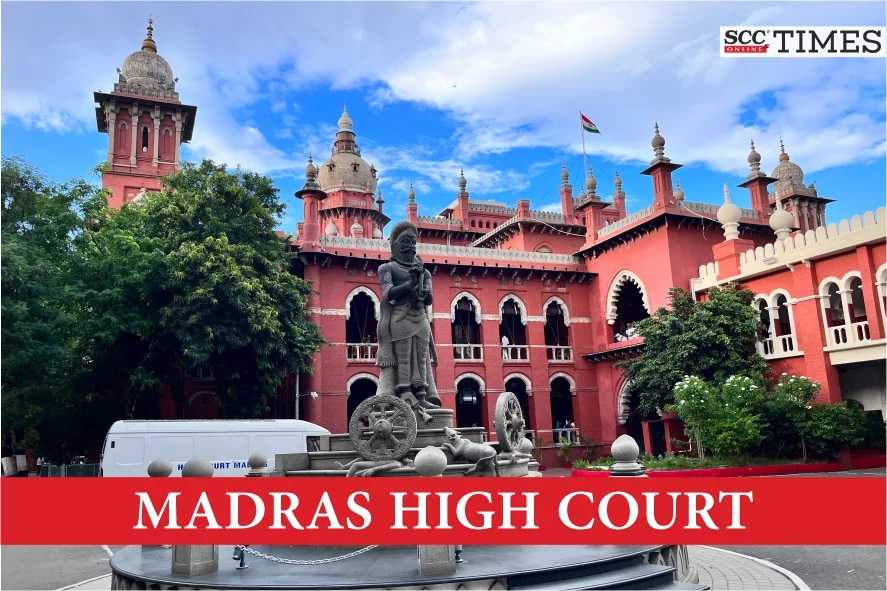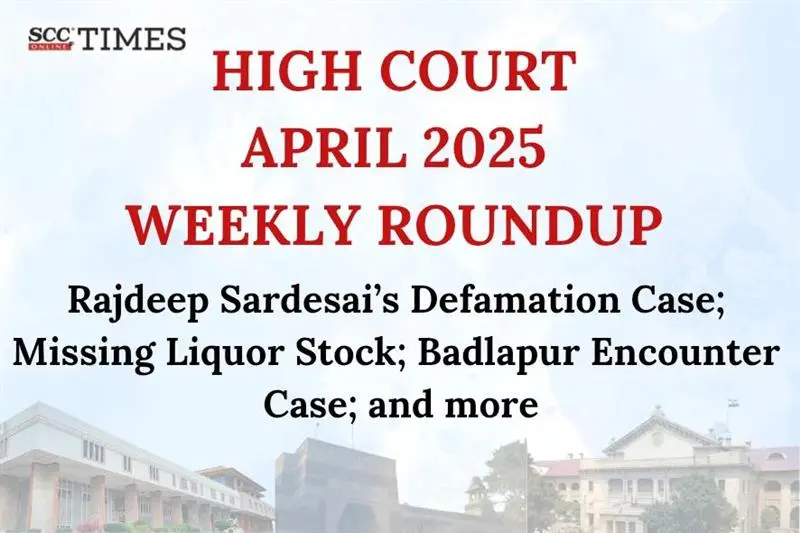Madras High Court: In a writ appeal filed by Canara Bank under Clause 15 of the Letters Patent, to set aside the order passed by the single judge, wherein the Court quashed the disciplinary proceeding and dismissal order against an employee, the division bench of G.R.Swaminathan* and P.Vadamalai, JJ. said that it is inconceivable that the entire proceedings could have been concluded in a fair manner within a period of two weeks. Thus, for gross violation of principles of procedural fairness, the impact of clause 5.2 on the disciplinary action, and the non-speaking nature of the order, the Court declined to interfere with the order of the Single Judge.
Background
The respondent joined Canara Bank in the year 1982 as an Agricultural Extension Officer. Over the years, he was granted several promotions, and by 2007, he had attained the position of Senior Manager in the grade of Scale III officer. Between August 2007 and July 2009, he was posted as the Branch Manager of the Madurai Pudhur Branch of the bank. During this period, the respondent sanctioned a large number of loans in favor of various self-help groups. However, on 27-07-2009, he was transferred from his position. On 13-07-2013, a charge memo was issued to the respondent, containing seven articles of charge. Specifically, the charge memo alleged that due to the respondent’s lapses, the bank was exposed to a potential financial loss of Rs. 1.66 crores.
The respondent was called upon to submit his explanation within fifteen days of receiving the charge memo. However, before the respondent could offer his explanation, an enquiry commenced on 17-07-2013. The enquiry was concluded the next day. Thereafter, the disciplinary authority passed an order on 27-07-2013 agreeing with the findings of the enquiry officer and imposing the punishment of dismissal from service.
Aggrieved by the same, the respondent filed an appeal before the appellate authority. The appellate authority dismissed the appeal, and the reviewing declined to interfere. Challenging these orders, the respondent filed a respondent, wherein the Single Judge set aside all the orders impugned in the writ petition. Challenging the order passed by the Single Judge, the present writ appeal has been filed by the bank management.
Analysis and Decision
The Court remarked that disciplinary proceedings should not be treated as a rapid, point-to-point journey, like a bullet train. A charge memo does not necessarily lead to punishment; the delinquent employee could also be exonerated. Therefore, the process should be conducted in a manner that leaves room for both outcomes, much like “two roads diverging in the yellow woods.” There must be halting stations throughout the process, and these halts should be meaningful, not just for the sake of formality. The proceedings need not be slow, but they must be carried out at a reasonable speed and with efficiency. The judge overseeing the judicial review must ensure that the process is permeated with fairness and that the final outcome does not appear predetermined.
The Court noted that “disciplinary proceedings of this nature would normally take at least a few months to conclude. ‘Justice hurried is justice buried’ is a well-known adage. It is inconceivable that the entire proceedings could have been concluded in a fair manner within a period of two weeks”.
The Court said that while the respondent was given fifteen days to offer his explanation, the charge memo was more in the nature of show-cause notice. Had the respondent’s explanation been deemed satisfactory, further proceedings could have been dropped. However, without waiting for his explanation, the enquiry officer was appointed, and the enquiry commenced on 17-07- 2013. The transactions in question occurred between August 2007 and July 2009, and the respondent, therefore, would not have had sufficient time to review the relevant documents. The charge memo referred to only three documents and proposed the examination of three witnesses. However, during the enquiry, a total of 96 documents were marked, and 17 witnesses were examined, all within a span of just two days. The enquiry authority submitted its report in a remarkably short time, by 23-07-2013. Ordinarily, the enquiry report would be submitted to the disciplinary authority for review, and after considering the report, the disciplinary authority could either agree with the findings or partly disagree. However, in this case, the respondent’s reply was sought immediately, and it remains unclear how the enquiry report was provided to the respondent. Despite these procedural concerns, the dismissal order was passed on 27-07- 2013.
The Court took note of Aureliano Fernandes v. State of Goa, (2024) 1 SCC 632, wherein the Court used the expression “whirlwind proceedings” since the entire process had been wrapped up by the authority concerned in flat 39 days.
The Court said that the expression “whirlwind proceedings” used by the Supreme Court would aptly apply to the case on hand also.
Based on the sequence of events, the Court concluded that some form of assurance must have been given to the respondent, suggesting that if he cooperated, he would be let off lightly. Otherwise, no delinquent would willingly participate in the enquiry proceedings without submitting their defence statement. The fact that the respondent’s reply was immediately submitted to the enquiry officer further indicated that some persuasion had been applied on the respondent. The Court observed that the writ respondent had been led like a lamb to be mercilessly slaughtered. The Court emphasized that the principle of estoppel by conduct cannot be invoked against the delinquent in this case. When it comes to adhering to principles of procedural fairness, the Court expects employers to set an example. Employers cannot take advantage of an employee’s acquiescence. By no stretch of the imagination could the process that took place in this case be considered fair. On this sole ground, the Court justified interference in the matter.
The Court noted that the Single Judge had highlighted the applicability of the bar of limitation in this case. The management had issued a Circular regarding staff accountability. In the present case, only procedural lapses were found to be proven, and there was no evidence to suggest that the respondent had gained any undue advantage. The Court found considerable merit in the argument of the respondent’s counsel that, as a senior manager, the respondent primarily acted as a counter-signing authority and did not conduct any field inspections. Given the significant pressure to grant loans to self-help groups at the time, no mala fides could be attributed to the respondent. Furthermore, between the respondent’s transfer from the Pudhur Branch and the issuance of the charge memo, two successive regular inspections were conducted. A full four years had elapsed between the date of the alleged occurrence and the charge memo being issued, with the respondent being transferred on 27-07-2009 and the charge memo issued on 13-07-2013. As such, any irregularity that occurred prior to 13-07-2013 could not form the basis for disciplinary action. Therefore, the Single Judge held that clause 5.2 of the relevant circular prevented the initiation of departmental action. In light of these considerations, the Court found no reason to interfere with the impugned order, which allowed the writ petition.
The Court stated that it had reviewed the orders passed by both the appellate authority and the reviewing authority. It noted that neither of these orders addressed the specific defenses raised by the respondent, which led the Single Judge to characterize them as non-speaking orders. For the three reasons outlined, namely, the gross violation of principles of procedural fairness, the impact of clause 5.2 on the disciplinary action, and the non-speaking nature of the order, the Court declined to interfere with the order of the Single Judge.
[General Manager & Reviewing Authority v. S.V.Mothilal, 2025 SCC OnLine Mad 2082, decided on 28-03-2025]
*Order by: Justice G.R.Swaminathan
Advocates who appeared in this case :
For Appellants : Mr.N.Dilip Kumar
For Respondent : Mr.M.E.Ilango







